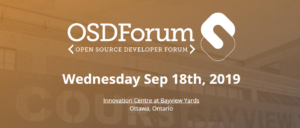Events
Arduinos, 3D printing, Lego Mindstorms and displays, submarine
robots, and AI, where can you find all this? All of this and MUCH MORE will be at the IEEE Ottawa Robotics
Competition (ORC), Ottawa’s largest robotics competition for grade 5 to 12
students. The ORC is taking place on Sunday,
June 2nd at Earl of March
Secondary School. Best times to show up are between 10:30 am to 12:30 pm and 1:30 pm to 4 pm. The ORC is completely
open to the public, so invite your friends and family too!
Check out previous competitions at https://youtube.com/user/ieeeorc/videos.
If you have any questions, please feel free to email us at orcinfo@ieeeottawa.ca.





The role of Internet and Communication Technology (ICT) in
bringing about a revolution in almost all aspects of human life needs no
introduction. It is indeed a well-known fact that the transmission of
information at a rapid pace has transformed all spheres of human life such as
education, health, and economy to name a few. In addition, with the advent in
Electronics and Photonics Technology (EPT), we have observed sustained growth
and expansion in computation and display technology. From user demography
perspective, urbanized population are the major beneficiary of such advances.
Therefore, the benefits of ICT and EPT are yet to be experienced by almost 4
billion people in the world who are still “unconnected or under-connected†and
suffer as such from the “digital divide,†a term coined in order to emphasize
the lack of ICT infrastructure in many parts of the world.
Major challenges for widespread adoption of ICT and EPT in
these areas are related to cost, lack of power supply, and complexities
associated with learning and usage. However, if we can categorically overcome
these challenges, then these technologies can be used for food, water, shelter,
energy, environment, education, healthcare, and security. In addition, the
wide-spread availability of these technologies, will lead to smart suburbs,
smart towns, smart villages, etc., without the need to necessarily live in
smart cities. This would reverse the trend and allow a more sustainable world
with a more balanced distribution of the population density. In this context,
this talk will present recently proposed solutions to provide high speed
connectivity in rural areas along progress in affordable electronics to serve
and contribute to the development of far-flung regions.
In particular, new solutions for both: (i) integrated
satellite-airborne-ground networks providing global coverage and connectivity
and (ii) terrestrial mesh/multi-hop directive networks connecting underserved
areas will be discussed.
Moreover, some examples of democratized wearable
electronics using Do-It-Yourself (DIY) assembly of paper along Android DIY
applications capturing and displaying vital health signs over connected
smartphones for real-time diagnosis will be presented.
Speaker 1: Hisham Abed, P.Eng., Ericsson
Topic:Â Power Integrity – Best design practices
Speaker 2: Dr. Ihsan Erdin, Celestica
Topic:Â Power Integrity Optimization amidst MLCC shortage
Parking:Â Free
Registration: Free, and is on a first to reply basis. Preference given to IEEE EMC and CPMT society members. Seating is limited. E-mail reservation is required.
Pizza and soft drinks will be served.
Organizer: Dr. Syed Bokhari, Chairman, IEEE Ottawa
EMC chapter
Syed.Bokhari@fidus.com,
Office :(613) 595 – 0507 Ext. 377, Cell: (613) 355 – 6632
Directions:Â Â Â www.fidus.com

The inaugural OSDforum will take place in Ottawa this September 18. It is of interest to System architects, software designers, hardware designers and researchers from government, industry and academia.
RISC-V is the 5th generation of the Reduced Instruction Set Computer (RISC-V) Instruction-Set Architecture (ISA), the OpenHW Group is a not-for-profit global organisation aiming to boost the adoption of open-source processors by providing a platform for collaboration, creating a focal point for ecosystem development, and offering open-source IP for processor cores.
Don’t miss out the opportunity to join this exciting new development platform and get your own RISC-V development board to keep. All this while learning from leading industry and academic experts focused on IoT, Edge and Machine Learning development that leverage open source SW and HW.
Space is limited and we have all indications that the event will sell out. Register today.
Advanced Optical Sources for Spectrally Efficient Photonic Systems
Liam Barry,
Dublin City University
Â
Abstract
The continuing growth in demand for bandwidth (from residential and business users), necessitates significant research into new advanced technologies that will be employed in future broadband communication systems. Two specific technologies which are becoming increasingly important for future photonic
systems are wavelength tunable lasers and optical frequency combs. Although these topics have been studied for over two decades their significance for the development of future ultra-high capacity photonic systems has only recently been fully understood. Wavelength tunable lasers are currently becoming the
norm in optical communication systems because of their flexibility and ability to work on any wavelength. However, as their operating principles are different to standard single mode lasers they can effect how future systems will operate.
For example as optical transmission systems move towards more coherent transmission (where the data is carried using both the intensity and phase of the optical carrier), the phase noise in these tunable lasers will become increasingly important. Optical frequency combs also have many applications for
future photonics systems, and for telecommunications they can be used to obtain the highest spectral efficiency in optical transmission systems by employing the technology of optical frequency division multiplexing (OFDM) that has been widely employed to increase spectral efficiency in wireless systems. Wavelength tunable lasers and optical frequency combs are thus topics at the leading edge of current photonics systems research, and their detailed understanding promises new applications in all-optical signal processing, optical sensing and metrology, and specifically telecommunications. This talk will focus on the development and characterization of various wavelength tunable lasers and optical frequency combs, and then outline how these sources can be employed for developing optical transmission systems and networks which make the best use of available optical spectrum.
Bio
Liam Barry received his BE (Electronic Engineering) and MEngSc (Optical Communications) from University College Dublin and his PhD from the University of Rennes. His main research interests are: all-optical signal processing, optical pulse generation and characterization, hybrid radio/fibre communication
systems, wavelength tuneable lasers for reconfigurable optical networks, and optical performance monitoring. He has worked as a Research Engineer in the Optical Systems Department of France Telecom’s Research Laboratories (now known as Orange Labs), and a Research Fellow at the Applied Optics Centre in Auckland University. He is currently a Full Professor in the School of Electronic Engineering at Dublin City University, establishing the Radio and Optical Communications Laboratory, and is a Principal Investigator for Science Foundation Ireland. He has published over 500 articles in internationally peer reviewed journals and conferences, holds 9 patents in the area of optoelectronics, and has co-founded two companies in the photonics sector.

